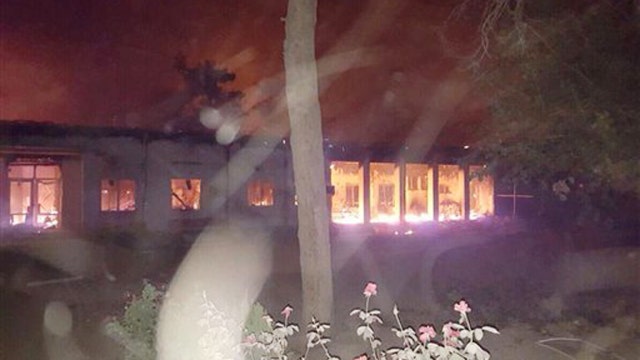Warnings of an Afghanistan powderkeg
Top US commander in Afghanistan: US strike on hospital was a mistake, withdrawal timetable should be reconsidered. Military vet Sen. Joni Ernst tells 'On the Record' we need to look seriously at our capabilities and conditions of our troops in the region
This is a rush transcript from "On the Record," October 6, 2015. This copy may not be in its final form and may be updated.
GRETA VAN SUSTEREN, FOX NEWS HOST: An Army green beret now has a chance to appeal his discharge. Sergeant First Class Charles Martland was ordered discharged after punching an Afghan commander who allegedly raped a young Afghan boy. Now the secretary of the army agreeing to postpone Martland's discharge for 60 days. Now this will give Sgt. Martland the chance to file an official appeal.
And America's top commander in Afghanistan, General John Campbell, is blasting President Obama's plan to slash the number of U.S. troops in Afghanistan.
(BEGIN VIDEO CLIP)
GEN. JOHN CAMPBELL, U.S. COMMANDER IN AFGHANISTAN: Only a few years ago, our coalition numbered over 140,000 military personnel. Now our forces comprise of fewer than 14,000 of which approximately 10,000 are U.S. servicemen and women. Collectively, the Afghan security forces are adapting to these changes and in some places they are struggling.
(END VIDEO CLIP)
VAN SUSTEREN: And it's not just the general. Senator John McCain says President Obama's plan to withdraw troops is not only political, but dangerous.
Iowa Senator Joni Ernst and members of the Senate Armed Services Committee joins me. And I must add that she is a vet having served in Afghanistan and Iraq, right?
SEN. JONI ERNST, R-IOWA: In Iraq. Not Afghanistan.
VAN SUSTEREN: All right, what's your thought on General John Campbell says that he is worried about the strategy. What is the president's strategy? Do you know?
ERNST: Well, I don't know that strategy. We lack, from the administration, a clear coherent strategy in Afghanistan. We see the rise of Taliban forces. We see the rise of ISIS, which is something that General John Campbell had mentioned today in the Senate Armed Services Committee. There is no strategy.
VAN SUSTEREN: Do you think that the general, I mean, it was quiet -- I mean, quite stunning when he said that. I mean, he's basically said we've got to do something else. Do you think he's communicating that? First to the White House, to President Obama before he comes out before the Senate committee and says that.
ERNST: I do believe he is communicating that. He is a no-nonsense commander. He is revered amongst all of our military members. And he has put forward a revised plan for the president and the administration. He was not able to detail that to us today, but we know that the president need to look at what his military leaders are stating as fact, which is we see ISIS gaining a foot hold in eastern Afghanistan. And we see the Taliban taking back cities that we once occupied.
VAN SUSTEREN: All right, is it political because the president's current plan is to pull out of Afghanistan by the end of 2016, which is when he says when he turns off the lights at the White House and new administration starts? Is that why it's political?
ERNST: Well, it is political from the president's perspective because he's used to setting goals, random goal based on a calendar, not based on capabilities or operations on the ground, which is what we need to evaluate. And that's what the general was stating today.
VAN SUSTEREN: All right, hospital. That terrible incident in Afghanistan at "Doctors without Borders."
How did that happen?
ERNST: Well, that is an interesting question. And it is something that we'll be look at. The D.O.D. is investigating right now. General Campbell says this was a mistake. So we know it's a very regrettable mistake.
(CROSSTALK)
VAN SUSTEREN: But how does a mistake? It said that it came from up the chain of command.
ERNST: Well, again, we have U.S. soldiers that are on the ground there. They are to train, advice and assist. So we know the information came from Afghanistan soldiers. And they were the once that made that call for help. Now how it happened that we struck that hospital, that's not known yet. Again, the D.O.D. will investigate.
VAN SUSTEREN: I mean, nobody wanted this to happen. Nobody at all. Maybe the terrorist on this, but is that when the Afghan says, you know, go hit this target. Do we go hit the target, or don't we have any sort of way of monitoring, double checking it?
ERNST: Well, I believe there is protocol in place, where we do double-check those coordinates and we know what we are striking. We don't know what happened and I can't speculate on what happened right now. We know that there are a number of investigations going forward. D.O.D. will be one. NATO will be another.
VAN SUSTEREN: Well, there's been a lot of criticism of the U.S. hitting -- having civilian casualties in Afghanistan. This is obviously, enormously besides being tragic for the death, loss of life, this is not good for us.
ERNST: Very regrettable.
VAN SUSTEREN: Senator, thank you. Nice to see you.
ERNST: Thank you. Great to see you.






















